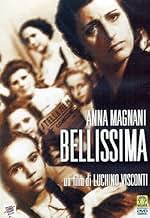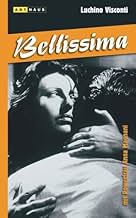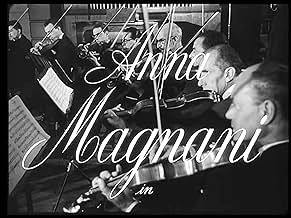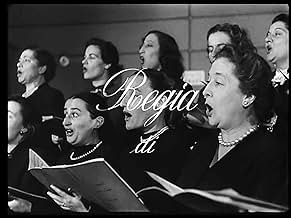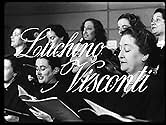CALIFICACIÓN DE IMDb
7.7/10
5.9 k
TU CALIFICACIÓN
Una mujer de clase baja intenta desesperadamente que su hija vaya al cine.Una mujer de clase baja intenta desesperadamente que su hija vaya al cine.Una mujer de clase baja intenta desesperadamente que su hija vaya al cine.
- Dirección
- Guionistas
- Elenco
- Premios
- 1 premio ganado y 1 nominación en total
Liliana Mancini
- Iris
- (as Iris)
Vittorio Musy Glori
- Self
- (as Vittorio Glori)
Opiniones destacadas
This is a very small story--a poor woman tries to make her daughter a child movie star--but it has a tremendous, operatic performance from Anna Magnani. Magnani is like all other stage mothers in that the success she desires for the child is really her frustrated ambition for herself (her tiny daughter has no interest in acting, and whines and cries all through the picture), but unlike them in that she never loses her sense of humour. When she realises she has been cheated, instead of becoming outraged, she laughs at her own foolishness, briefly relaxing from her usual blind intensity to become a normal, likable woman.
Her character's desperation to escape her life is understandable when one sees the dump she lives in with her husband and child. The small, dilapidated flat with stained walls, in a building full of fat, sour- faced harpies in hideous housedresses--one never sees such horrors in Hollywood films. Too bad this neo-realism became old-style realism--we could use some of this today as a counter to the candy-floss world we see on TV and in the movies.
One amusing note: The film-struck Magnani says at one point to her husband, "Oh, Burt LanCASter! Molto gentile!" Three years later Lancaster would be playing her lover in The Rose Tattoo.
Her character's desperation to escape her life is understandable when one sees the dump she lives in with her husband and child. The small, dilapidated flat with stained walls, in a building full of fat, sour- faced harpies in hideous housedresses--one never sees such horrors in Hollywood films. Too bad this neo-realism became old-style realism--we could use some of this today as a counter to the candy-floss world we see on TV and in the movies.
One amusing note: The film-struck Magnani says at one point to her husband, "Oh, Burt LanCASter! Molto gentile!" Three years later Lancaster would be playing her lover in The Rose Tattoo.
In "Bellissima" (1951) an overambitious mother drags her 6 year old daughter to a talent show. The theme of "Bellissima" has something in common with "Little miss sunshine" (2006, Dayton & Faris). In both cases the daughter has no chance against the barby dolls that are her opponents. In "Little miss sunshine" the initiative is however by the daughter herself (although her parents ought to do more to protect her). In "Bellissima" the initiative lays cleary by the overambitious mother.
"Bellissima" was the end of the neo realist period in the carrier of Luchino Visconti, after films such as "Ossessione" (1943) and "La terra trema" (1948). The film is situated in a workers environment but live in this environment is no longer as bad as it was in the heydays of neorealism. In fact live in the showbusiness of Cinecitta is much more ruthless.
The lead actress Anna Magnani is still a true representative of the neo realist age. Think about her role in "Roma, citta aperta" (1945, Roberto Rossellini). In "Bellissima" she is brilliant as the mother who is cheated by the Cinecitta employees but who is also cheating herself against other mothers and their "bellissima's".
The film tells a rather simple story but makes maximum use of facial expressions and close ups, especially those of Magnani herself and Tina Apicella (playing her daughter Maria). Especially towards the end of the film the close ups are tellng us more than a thousend words.
"Bellissima" was the end of the neo realist period in the carrier of Luchino Visconti, after films such as "Ossessione" (1943) and "La terra trema" (1948). The film is situated in a workers environment but live in this environment is no longer as bad as it was in the heydays of neorealism. In fact live in the showbusiness of Cinecitta is much more ruthless.
The lead actress Anna Magnani is still a true representative of the neo realist age. Think about her role in "Roma, citta aperta" (1945, Roberto Rossellini). In "Bellissima" she is brilliant as the mother who is cheated by the Cinecitta employees but who is also cheating herself against other mothers and their "bellissima's".
The film tells a rather simple story but makes maximum use of facial expressions and close ups, especially those of Magnani herself and Tina Apicella (playing her daughter Maria). Especially towards the end of the film the close ups are tellng us more than a thousend words.
In a post-war Italy, Maddalena Cecconi (Anna Magnani) is a woman from the lower classes abused by her husband Spartaco Cecconi (Gastone Renzelli), who is obsessed to make her young daughter Maria (Tina Apicella) a star in the cinema industry. She expects a better life for Maria, and she sacrifices her marriage and her savings paying interpretation and ballet teachers, dress, hairdresser and bribe for the small time crook Alberto Annovazzi (Walter Chiari) to make her dream come true. When the director sees the test of Maria, Maddalena realizes the reality and cruelty of the entertainment industry.
"Belissima" is a beautiful tale of disillusion. Anna Magnani has a magnificent interpretation in a role of a very poor mother and frustrated woman, spanked by her husband, trying to give a better life for her young daughter. Living nearby a movie theater, she sees the opportunity when a famous director is chasing a young talent for his next movie. Her characters gives the best effort within her short culture and vision trying to make her dream comes true, being very touching the moment when her dreams are shattered. The direction of Luchino Visconti is precise and flawless as usual, and the story is very real and credible. My vote is eight.
Title (Brazil): "Belíssima" ("Very Beautiful")
"Belissima" is a beautiful tale of disillusion. Anna Magnani has a magnificent interpretation in a role of a very poor mother and frustrated woman, spanked by her husband, trying to give a better life for her young daughter. Living nearby a movie theater, she sees the opportunity when a famous director is chasing a young talent for his next movie. Her characters gives the best effort within her short culture and vision trying to make her dream comes true, being very touching the moment when her dreams are shattered. The direction of Luchino Visconti is precise and flawless as usual, and the story is very real and credible. My vote is eight.
Title (Brazil): "Belíssima" ("Very Beautiful")
If you see only one film by Anna Magnani, see BELLISSIMA. The is "La Magnani" at her comic best. Get the video with English subtitles because even if your italian is good, the verbal onslaught is thick and fast. Preferably one should see this film on the big screen to get the full impact of Magnani's performance. She plays a stage mother who is trying to get her young, tiny little girl into the movies. Magnani's warmth, wit, slyness and sheer volcanic beauty leap from the screen. I am amazed that Hollywood has not re-made this film. It would be the perfect vehicle for Barbra Streisand or Bette Midler and would assure them of an Oscar nomination. Unlike her English language roles, such as "The Rose Tattoo" or "The Secret of Santa Vittoria", in BELLISSIMA Magnani acts in her native italian voice. It makes all the difference in the world. When she acted in English, she was stilted and restrained; the language barrier, although she made super-human, heroic efforts to master English, is nonetheless felt. But in her native tongue, Magnani lets loose with a bravura performance. I defy anyone not to fall in love with her after watching BELLISSIMA.
It was as if I had taken a time machine back to 1951. Sitting at the open theater of Tiberina Island in Rome, Anna Magnani's voice bounced off the ancient angles of this stunning roman spot. "Bellissima" is a timeless masterpiece. A rarity in Visconti's oeuvre. He puts all of his uncanny attention to detail to the service of Magnani's bombastic, tender, funny, extraordinary performance. Visconti knew how to bring the best in his actors. Even Maria Callas who, under Visconti's guidance, went from the greatest Opera singer to the greatest actress singing Opera. There are moments in "Bellissima" that can only be described as a love letter from Visconti to Magnani and vice versa. She has a few close ups that tells us how much love, respect and admiration existed between this two enormous artists. Look at her moments in the mirror, combing her hair naturally, debating under her breath the proper pronunciation of a word. She, not a conventional beauty, looks ravishing. The message about the dangers of immediate fame and fortune could have been written today. If you have a chance, don't miss it. If you love film, it's a must!
¿Sabías que…?
- TriviaIn the final scene, Anna Magnani hears the film playing outside her room and remarks that she hears Burt Lancaster. Magnani would win an Oscar four years later for The Rose Tattoo, in which she would costar with Lancaster.
- ConexionesEdited into Al Centro del cinema (2015)
Selecciones populares
Inicia sesión para calificar y agrega a la lista de videos para obtener recomendaciones personalizadas
- How long is Bellissima?Con tecnología de Alexa
Detalles
- Tiempo de ejecución1 hora 54 minutos
- Color
- Relación de aspecto
- 1.37 : 1
Contribuir a esta página
Sugiere una edición o agrega el contenido que falta

Principales brechas de datos
By what name was Bellissima (1951) officially released in Canada in English?
Responda

